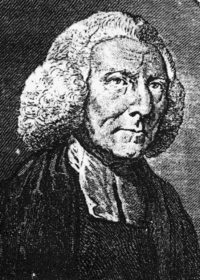Samuel Pegge
| Samuel Pegge | |
|---|---|

frontispiece to Forme of Cury
|
|
| Born | 5 November 1704 Chesterfield, Derbyshire |
| Died | 14 February 1796 (aged 91) |
| Education | Chesterfield |
| Occupation | Vicar and Antiquarian |
| Spouse(s) | Anne Clarke |
| Children | three |
| Parent(s) | Christopher and Gertrude Pegge |
Samuel Pegge the elder (5 November 1704 – 14 February 1796) was an antiquary.
Born at Chesterfield, Derbyshire, he was the son of Christopher Pegge and his wife Gertrude, daughter of Francis Stephenson of Unstone, near Chesterfield. Christopher Pegge (died 1723) belonged to a family that had lived for several generations at Osmaston, near Ashbourne, Derbyshire, was a woollen dealer in Derby and later a lead merchant in Chesterfield. Samuel's father was mayor of Chesterfield three times. Samuel published an important study on the Roman roads of Derbyshire as well as notes which his son, also Samuel, continued on the subject of Derbyshire words and phrases.
Samuel Pegge was educated at Chesterfield and he became a pensioner and scholar of St. John's College, Cambridge, in 1722. He graduated B.A. 1725, M.A. 1729. He was elected to a lay fellowship on the Beresford foundation of his college on 21 March 1726, but was removed in favour of Michael Burton (afterwards vice-master of St. John's), who claimed founder's kin. Pegge was then made an honorary fellow, and in 1729 was elected a ' Platt ' fellow of St. John's. In 1730 he was elected a member of the Spalding Society, to which he contributed some papers, and from 1730 to 1732 belonged to the Zodiac Club, a college literary society consisting of twelve members denominated by the signs of the zodiac. Pegge was the original Mars.
Pegge was ordained in 1729, and in 1730 became curate to Dr. John Lynch at Sundridge in Kent. On 6 December 1731 he became the vicar of Godmersham, Kent, where he lived for about twenty years, writing on antiquities and collecting books and coins. From 1749 to 1751 he lived at Surrenden, again in Kent, as tutor to the son of Sir Edward Dering. In 1751 he was elected fellow of the Society of Antiquaries, and in the same year was inducted into the rectory of Old Whittington, near Chesterfield, exchanging Godmersham for the rectory of Brinhill (or Brindle), Lancashire. On 22 Oct. 1758 he exchanged Brinhill for the vicarage of Heath, near Whittington, holding Heath together with Whittington until his death.
...
Wikipedia
